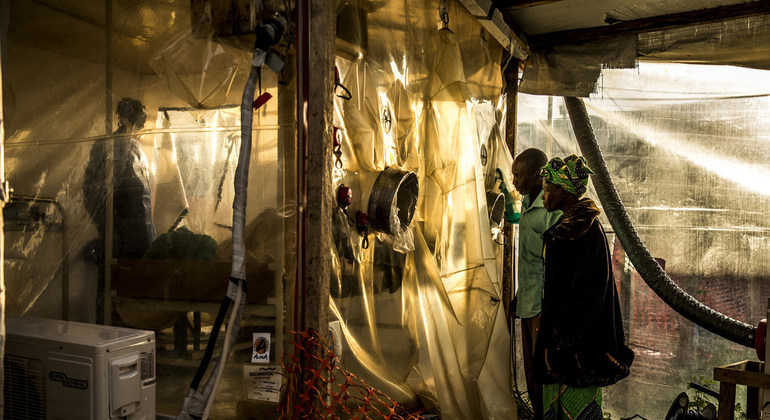Amidst a surge in new cases, the epidemic has claimed more than 1,200 lives and threatens to spread to other provinces in the east, as well as neighbouring countries. A third of those infected have been children; a higher proportion than during previous outbreaks.
Up to the middle of this month, the number of cases, according to UN figures, stood at 1,847 (1,759 confirmed and 88 probable). In total, there have been 1,223 deaths (1,135 confirmed and 88 probable) and 487 people have survived the deadly virus.
“The Ebola response is working in an operating environment of unprecedented complexity for a public health emergency—insecurity and political protests have led to periodic disruptions in our efforts to fight the disease,” said EERC David Gressly, who also serves as the deputy chief of the UN Stabilization Mission for the DRC, MONUSCO.
Although the UN and non-governmental organizations (NGOs) have supported the Government and Congolese efforts to contain the virus in parts of Ituri and North Kivu provinces, ongoing insecurity and community mistrust continue to hamper access. This hinders the World Health Organization (WHO) and the Health Ministry from detecting, treating and vaccinating sick people, ultimately leading to more intense Ebola transmission.
The increasingly complex environment has prompted the UN, in partnership with the Government and others, to strengthen its political engagement and operational support to negotiate better access to communities; increase support for humanitarian coordination; and bolster preparedness and readiness planning for the Goma region, and neighbouring countries.
For its part, WHO is adapting public health strategies to identify and treat people as quickly as possible; expanding vaccination to encompass more people; and redoubling efforts to stem health facility transmissions.
The heart of the matter
Pointing out that “an enhanced UN-wide response is required to overcome these operating constraints”, Mr. Gressly underscored that “this includes moving senior leadership and operational decision making to the epicenter of the epidemic in Butembo”, where Secretary-General António Guterres has established a strengthened coordination and support mechanism.
Additional UN measures will bolster the critical work of NGOs and agencies on the ground, including UNICEF, which is leading community engagement activities; providing psychosocial interventions; and helping to prevent infection through water, sanitation and hygiene services.
Additionally, strengthened financial planning and reporting will be accelerated to ensure the sustainable and predictable funding required wage a strategic Ebola response plan.
“This system-wide and international support is exactly what WHO has been calling for”, said Ibrahima Socé Fall, the UN health agency’s Assistant Director-General of Emergency Response. Acknowledging that the outbreak response must be “owned by the local population”, he was heartened that the new approach reflects what has been asked for, namely “better security for patients and health workers, wider access to vaccination, and a more humane face to the response”.
Dr. Fall has been in Butembo since the end of March, working alongside the WHO Ebola Incident Manager, Dr. Michel Yao. In the capital Kinshasa, WHO has appointed Dr. Peter Graaff to coordinate with partners there. WHO will also continue to coordinate public health interventions that are being implemented by other UN partners.
As EERC, Mr. Gressly will work closely with WHO as it continues to underpin the Government’s response by leading all health operations and technical support activities.



